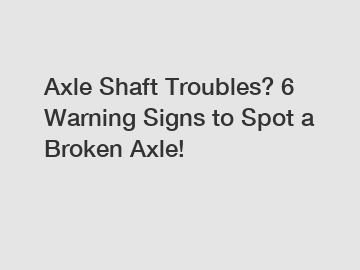Feb. 02, 2024
If you are an automotive enthusiast or a regular driver, you understand the vital role that axles play in ensuring a smooth and safe ride. These sturdy components connect your wheels to the transmission and provide power to propel your vehicle forward. However, like any other mechanical part, axle shafts are susceptible to wear and tear, which can eventually lead to a broken axle. To save yourself from potential accidents and costly repairs, it's crucial to spot the warning signs of a broken axle. In this blog, we will discuss six common signs to look out for.
1. Unusual Vibrations:
One of the first signs of a broken axle is unusual vibrations or shaking sensations while driving. If you notice your vehicle trembling under specific driving conditions, such as during acceleration, turning, or at high speeds, it's a strong indication that your axle is damaged or fractured. Even a small crack in the axle shaft can cause these vibrations, so it's important not to ignore them.

2. Clicking or Clunking Sounds:
When a vehicle's axle is on the verge of a break, you may hear clicking or clunking sounds, particularly while making turns. This noise is usually caused by a failing CV joint, which is part of the axle assembly. A damaged CV joint can result in the loss of lubrication, leading to metal-on-metal grinding and the subsequent clicking or clunking noise. Prompt attention to this warning sign can help prevent further damage.
3. Irregular Tire Wear:
Keep a close eye on your tires for signs of uneven or premature wear. A broken axle can cause excessive strain on certain tires, leading to abnormal wear patterns. If you notice excessive tread wear on one or more tires, it may indicate a problem with your axle. Additionally, if your vehicle constantly pulls to one side or experiences a noticeable change in handling, it's important to have your axle inspected as soon as possible.
4. Grease on the Inner Edge of Tires:
If you notice thick and greasy substances on the inner edge of your tires, it is likely due to a faulty axle boot. Axle boots are protective coverings that prevent grease leakage from the CV joints. When the boots tear or crack, the grease accumulates on the tires. This is a clear sign that your axle requires immediate attention, as running without proper lubrication can lead to accelerated damage and eventual failure.
5. Difficulty in Turning or Noisy Steering:
A broken axle can also manifest as difficulty in turning, particularly at lower speeds. You may experience resistance when trying to turn the steering wheel, or the steering may feel jerky or overly loose. These problems can be attributed to an axle that is no longer able to transfer power efficiently to the wheels. Addressing these issues promptly will ensure optimal vehicle control and prevent accidents on the road.
6. Unpleasant Odor:
If you notice a strong burning smell emanating from underneath your vehicle, it could indicate a friction-related issue with the axle. A broken axle may cause excessive heat buildup due to increased friction between the failing components. Besides the unpleasant odor, you may also observe smoke or steam coming from the vicinity of the axle. Do not ignore these signs, as they can lead to severe damage or even a complete axle failure.
Conclusion:
Keeping a watchful eye on your vehicle and being aware of the warning signs of a broken axle can save you from hazardous situations and costly repairs. If you notice any of the symptoms mentioned in this blog, it is essential to seek professional help immediately. Remember, regular maintenance and timely inspections are key to ensuring your axle remains in good condition, guaranteeing smooth rides for miles to come. Stay vigilant, take immediate action, and enjoy a safe and hassle-free driving experience!
Want more information on how to know if axle is broken, steering axle truck, German Axle Manufacturers? Feel free to contact us.
Previous: Revolutionizing Automotive Technology: Uncover American Axle Products Innovations
Next: Boost Your Trailer Efficiency: Ultimate Guide to Different Suspension Types
If you are interested in sending in a Guest Blogger Submission,welcome to write for us!
All Comments ( 0 )